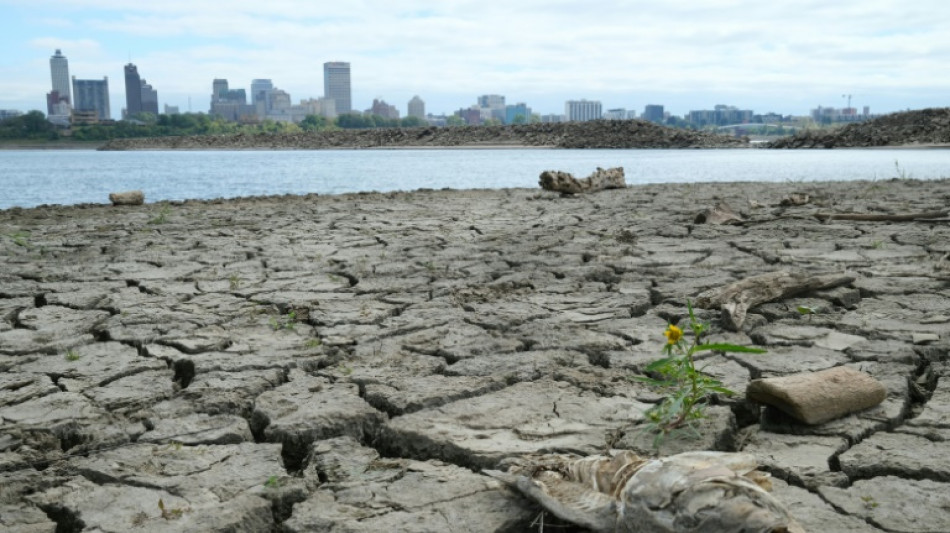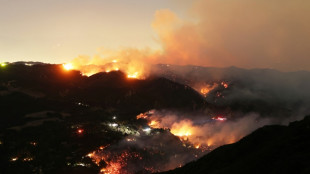

Hottest October globally marks fifth record-shattering month
Last month was the hottest October on record globally, Europe's climate monitor said Wednesday, as months of exceptional heat likely to make 2023 the warmest year in history.
With temperatures soaring beyond previous averages by exceptional margins, scientists say the pressure on world leaders to curb planet-heating greenhouse gas pollution has never been more urgent as they prepare to meet in Dubai for the UNCOP28 climate conference this month.
Drought parched parts of the United States and Mexico during October, while huge swathes of the planet saw wetter than normal conditions often linked to storms and cyclones, said the EU's Copernicus Climate Change Service (C3S).
Sea surface temperatures were the highest ever recorded for the month, a phenomenon driven by global warming that scientists say plays a key role in driving storms to be more ferocious and destructive.
"October 2023 has seen exceptional temperature anomalies, following on from four months of global temperature records being obliterated," said Samantha Burgess, C3S Deputy Director.
"We can say with near certainty that 2023 will be the warmest year on record, and is currently 1.43 degrees Celsius above the preindustrial average. The sense of urgency for ambitious climate action going into COP28 has never been higher."
The landmark Paris Agreement saw nearly 200 countries pledge to limit global warming to well below two degrees Celsius since the pre-industrial era and preferably a safer 1.5C.
These temperature thresholds will be measured as an average over several decades, rather than a single year.
This year has also seen the beginning of a warming El Nino weather phenomenon -- which warms waters in the southern Pacific and stokes hotter weather beyond -- although scientists expect the worst effects to be felt at the end of 2023 and into next year.
October was 1.7C warmer than an estimate of the October average for the preindustrial era, Copernicus said.
Global average temperatures since January have been the highest in records going back to 1940, the monitor added, registering 1.43C above the 1850-1900 pre-industrial average.
Beyond these official records, scientists say proxy data for the climate going back further -- like tree rings or ice cores -- suggests the temperatures seen this year could be unprecedented in human history, potentially the warmest in more than 100,000 years.
- 'Uncharted territory -
Average sea surface temperatures for the month excluding the polar regions also reached all-time highs for October, at 20.79C.
Oceans have absorbed 90 percent of the excess heat produced by human activity since the dawn of the industrial age, according to scientists.
Warmer oceans are linked to an increase in the intensity of storms and the melting of crucial ice shelves buffering the vast ice sheets of Greenland and Antarctica, threatening destructive sea level rise.
A warmer atmosphere also holds more moisture, resulting in heavier rainfall.
Leaders meeting in the United Arab Emirates for the November 30 to December 12 COP28 conference will have to respond to a damning progress report on the world's Paris pledges after major scientific reports have made clear that the world is far off track.
Carbon emissions -- largely from fossil fuels -- continue to creep up when they need to be slashed in half this decade.
Just under 1.2 degrees Celsius of temperature rise above pre-industrial levels has triggered a range of calamitous and costly weather extremes.
People across the planet have faced heatwaves and droughts this year, while severe flooding has struck in the US, China and India and beyond.
In Canada, record wildfires partly related to climate change released more carbon dioxide than the country's total 2021 greenhouse gas emissions, according to a "State of the Climate" report published by a group of prominent scientists last month.
The report warned that humanity had veered into "uncharted territory" with warming that imperils life on Earth.
Lead author William Ripple, a professor at Oregon State University said it was likely that annual average temperatures would start to be recorded above 1.5C.
"As warming continues, we face increasing danger from amplifying climate feedback loops and tipping points such as ice sheet melting and forest dieback," he said.
"Once crossed, these tipping points could change our climate in ways that may be difficult or impossible to reverse."
A.Goretti--IM




